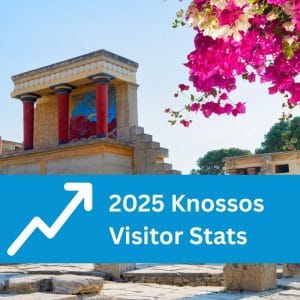
Rising Visitor Numbers at the Palace of Knossos Strengthen Expectations for 2026
Over 1,000,000 visitors in 2025 Visitor figures for the Palace of Knossos in 2025 demonstrate a particularly strong performance, with the number of visitors since
A typical visit to Knossos Palace takes between 45 minutes and 2 hours, depending on your pace and whether you explore on your own or with an audio guide. Our agency welcomes you!
Plan Wisely. No Availability of Last Minute Tickets Due to High Demand. Book your tickets for Tommorow.
08:00 - 19:00 Free Parking adjacent to the site.
08:00 - 17:00 Last Entrance to the Site at 16:00

Experience seamless, eco and budget-friendly exploration with Knossos self-guided audio tour. Enjoy high-quality voiceover narration and intuitive, plain and easy-to-use interfaces, all while contributing to sustainable tourism practices without printing papers. Discover a smarter, more engaging and budget friendly way to explore Knossos.
Situated a mere 5 km south of Heraklion, the majestic Knossos Palace is a top-tier attraction for travellers in Crete. Its accessibility by both car and bus adds to its appeal.
The palace traces its origins back to the Neolithic era, with its most notable development phase occurring during the Minoan period. As the cornerstone of the Minoan civilisation, Knossos Palace held significant importance and was highly esteemed.
Step through the grand South Propylon, where the echoes of ancient processions still linger. Imagine ceremonial rites unfolding in the Central Court, with priests offering libations under the gaze of painted griffins. Beyond the storied walls, discover the mysterious North Lustral Basin, its purpose still debated by scholars, yet its aura undeniably sacred. At Knossos, every stone holds a secret waiting to be uncovered.
Present day visitors can meander through the captivating remnants of this ancient palace, gaining insights into its intriguing history and the role it played.
The sprawling ruins of Knossos Palace are captivating, offering history aficionados a wealth of insights. Its remarkably preserved state provides an enchanting window into the everyday life of the Minoans. Besides being an architectural marvel, Knossos also housed the mythical Minotaur, according to legend, lending it an aura of enchantment.
It was considered a mystical location by King Minos, who purportedly kept the Minotaur within a labyrinth here.
Furthermore, Knossos holds the distinction of being the birthplace of Linear A writing, an ancient form of script, which, fascinatingly, remains partially undeciphered. Those with a passion for ancient cultures and histories will find Knossos Palace an irresistible destination.
Knossos Palace stands out in historical records not merely as a royal residence but as a vibrant epicentre for administration, trade, and culture. Its numerous in-house workshops were bustling hubs where craftsmen fashioned goods destined for trade across the Mediterranean. Adding to its significance, it served as a critical port city, owing to its strategic coastal location. This amalgamation of economic, political, and cultural functions renders Knossos one of Europe’s most essential archaeological sites.
The epoch known as the Minoan period draws its moniker from the mythical King Minos, whose rule over Crete is part of ancient lore. This era is frequently regarded as Crete’s golden age, with the construction of Knossos Palace being one of its most notable achievements.
This grand palace was not just a vast residential complex but also functioned as the central government hub. It is widely believed that a volcanic eruption in 1450 BC led to the palace’s destruction. However, much of its remarkable art and architecture survived the ravages of time and can be experienced by present-day visitors.
Licenced Official Tickets | One-Click Booking | Ticket Includes PDF
Quick Response Times
Send us a mail at tickets@knossos-palace.gr
GoTixy is an online travel agency dedicated to offering high-quality service with a personal touch.
Our work is inspired by a genuine passion for archaeology and cultural heritage. We believe that history should be accessible to everyone — not just scholars and experts. That’s why we focus on creating simple, reliable, and user-friendly solutions for travelers who want to explore the ancient world with ease and confidence.
At GoTixy, we don’t just sell ticket bundles — we open doors to the past
Relieve the legend of Minotaur, which was kept in the labyrinth, and learn about the palace’s connection to this ancient creature.
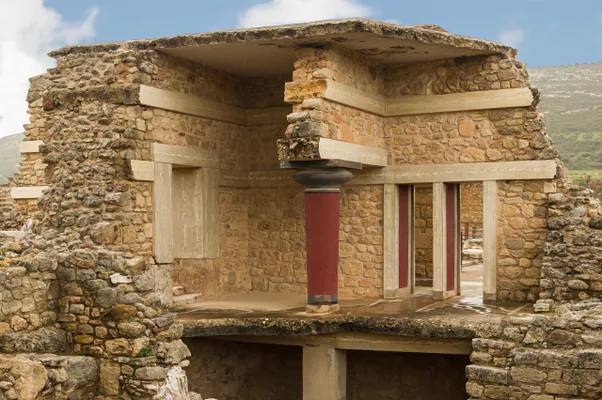
This magnificent site, dating back over 3,000 years, is steeped in history and mythology. One of the most fascinating areas of the site is the South Propylaeum, a monumental structure that played a crucial role in ancient ceremonies and events. Join us as we delve into the secrets of the South Propylaeum and discover its importance to ancient Greek culture.
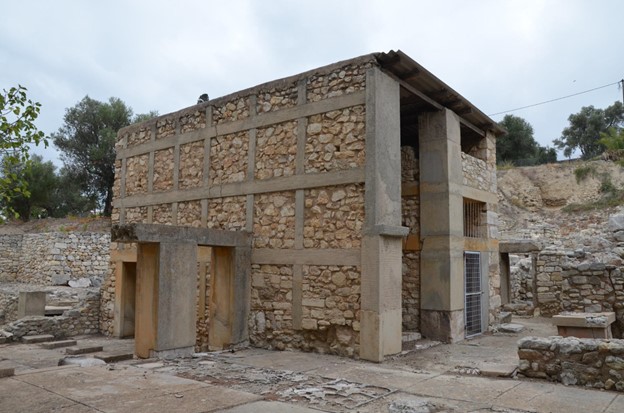
Within the sprawling complex of Knossos lies the Royal Villa, a magnificent building that stands out for its unique architectural features and richly decorated interiors. In this blog post, we will delve into the fascinating history, architecture and cultural significance of the Royal Villa at Knossos, revealing some of the secrets of one of the world’s oldest civilizations
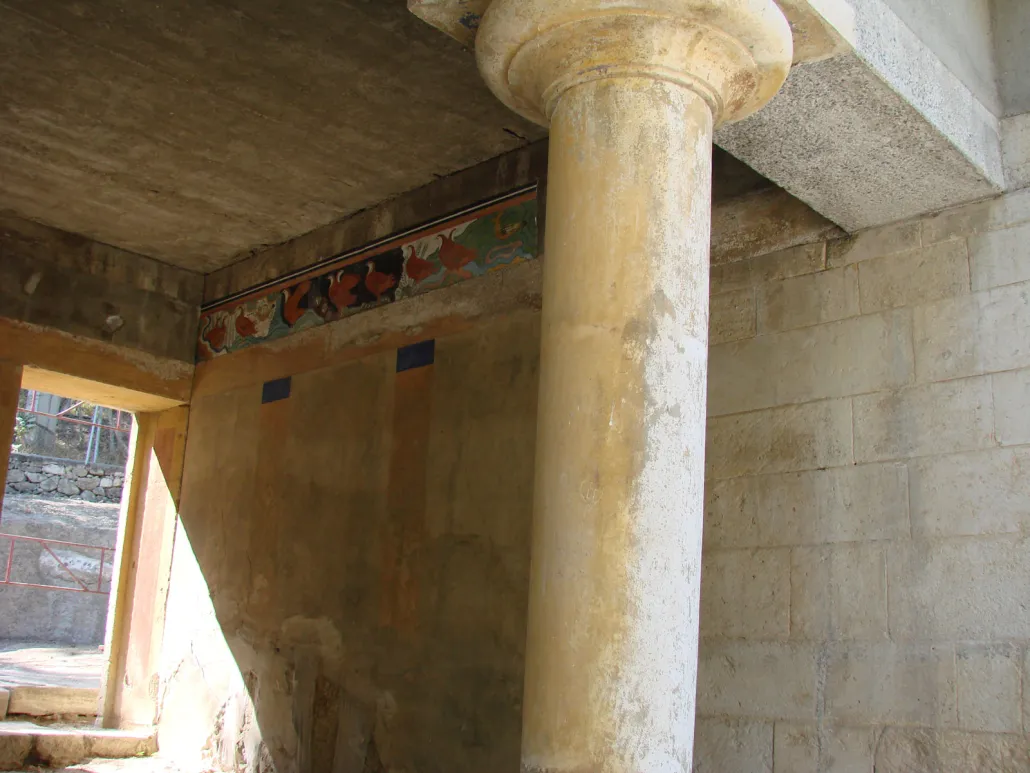
The Caravanserai, Built during the Neopalatial period, this two-story building served as a public reception venue for travelers and their goods. We will delve into its unique architecture, luxurious rooms, verandas, storerooms, central building and public function, plumbing system, and Stone Bath.
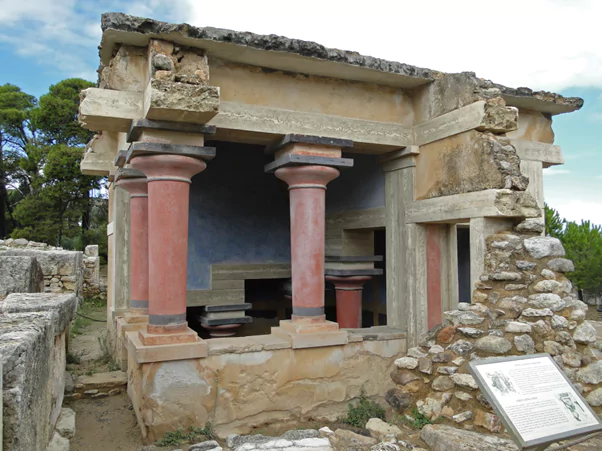
During the Minoan period, many palaces and villas featured subterranean structures. Archaeologists have proposed several theories about the purpose of these structures, including storage, workshops, or even hiding places during times of war. However, many experts agree that the subterranean areas of Minoan palaces and villas were primarily used for purification ceremonies
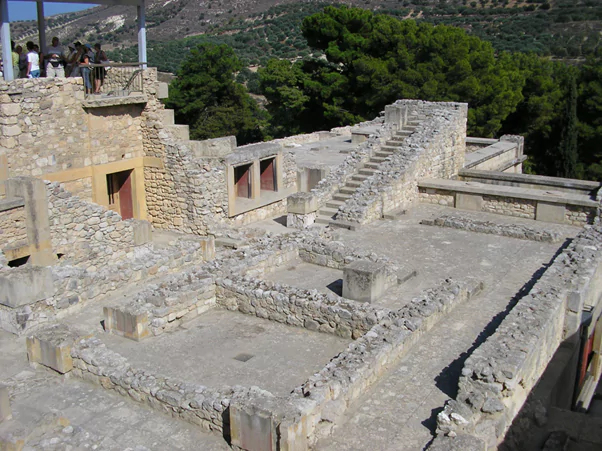
The site is home to numerous structures, including the iconic East Wing, which was once the heart of the palace. The East Wing is an extraordinary architectural marvel and has fascinated scholars, archaeologists, and tourists alike for centuries. In this blog post, we will explore the history and significance of the East Wing, its architecture, and the various challenges involved in its preservation
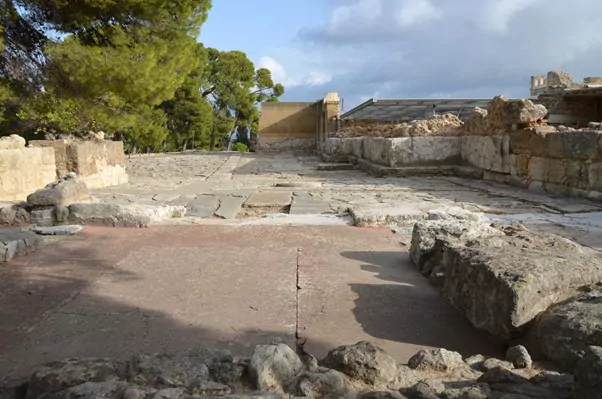
As a significant cultural site dating back to the Bronze Age, the palace still holds vital clues to early Greek civilization and architecture. One of the most striking features of the Palace is the West Court and the façade that graces its wall.
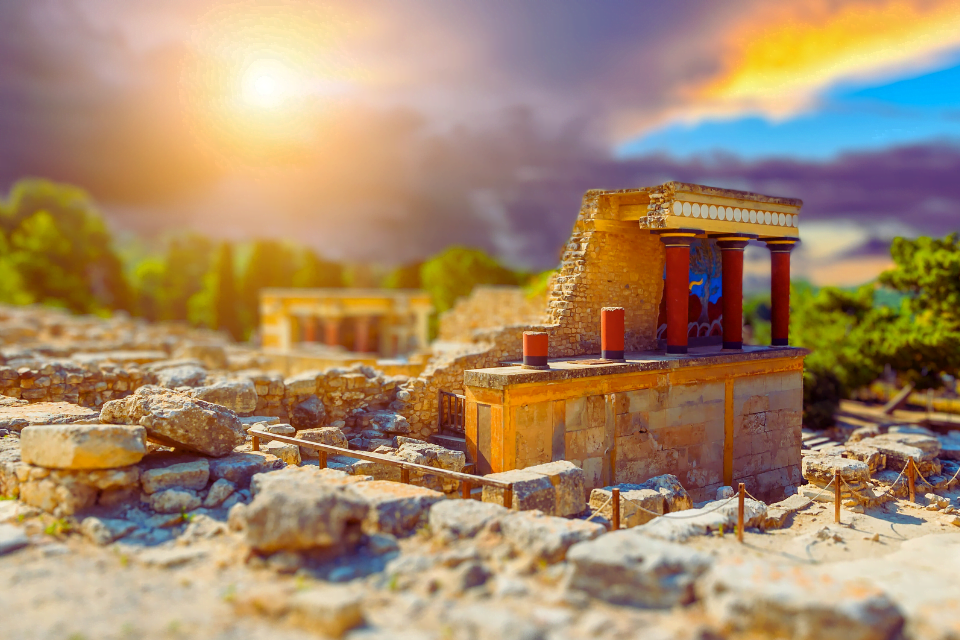
The Little Palace in Knossos, a magnificent edifice that served as a hub for palace administration, religious ceremonies, and social gatherings. In this blog post, we will take you on a journey through the history, architecture, religious functions, and restoration efforts of the Little Palace. As we unravel the mysteries of this marvel of Minoan Knossos, you will discover why it is an ideal destination for cultural tourists and history buffs alike.
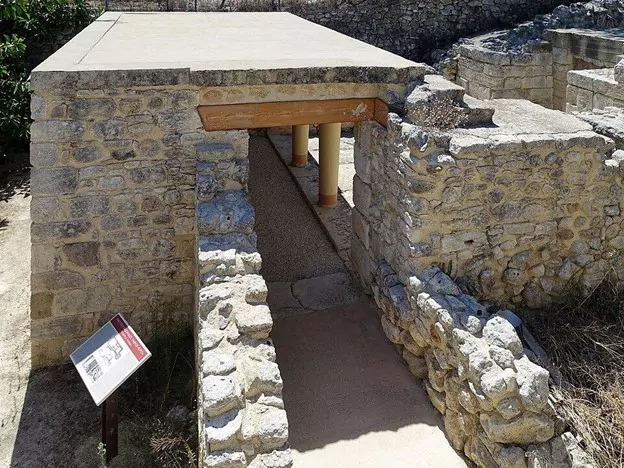
Located south of the Palace of Knossos, the Temple Tomb is one of the most fascinating ancient ruins in Crete. While its original purpose remains unknown, the Temple Tomb was likely used for both funerary and cult functions during the Neopalatial period. Over time, the building underwent successive phases of repair, and it still offers insight into the rich cultural and religious practices of the Knossian community. This blog post will explore the Temple Tomb’s history, architecture, and significance, inviting international tourists to discover this window into ancient Cretan culture

Over 1,000,000 visitors in 2025 Visitor figures for the Palace of Knossos in 2025 demonstrate a particularly strong performance, with the number of visitors since

The Foundation of the Hellenic World (FHW) has announced plans for a new, large-scale interactive digital tour of the Palace of Knossos, aiming to virtually

When planning your visit to the iconic Palace of Knossos, securing a legitimate entry ticket is essential—not just for access, but also for peace of

HERAKLION, CRETE – As the island of Crete prepares for another busy tourism season, visitors planning their trips to the world-renowned archaeological site of Knossos

Knossos Palace Breaks Visitor Records in 2024The Palace of Knossos shattered all visitation records in 2024, surpassing the one-million-visitor milestone. This achievement is attributed in
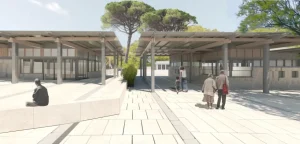
A different, more welcoming and functional appearance will be given to the archaeological site of Knossos in the coming years through a series of restoration
Knossos Palace inspired many artists through the history
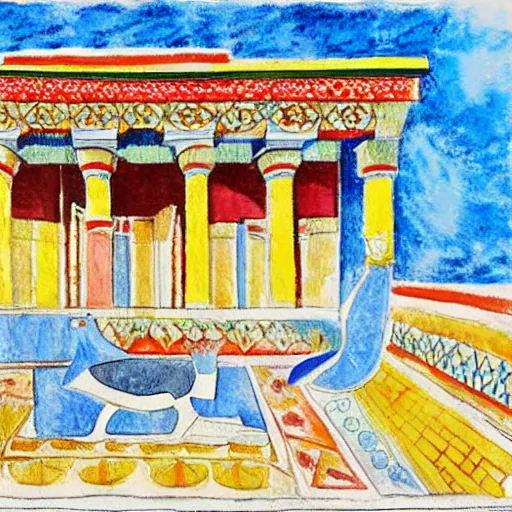

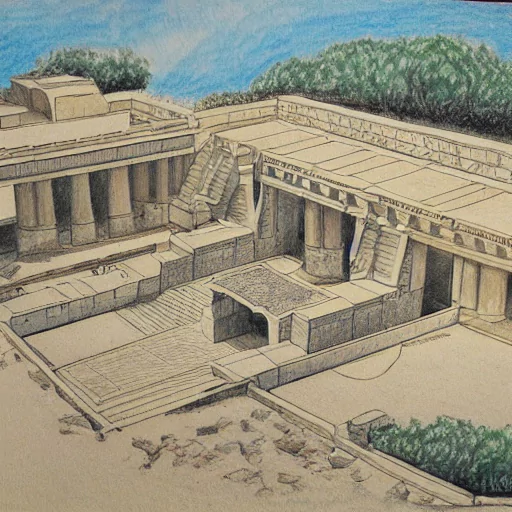

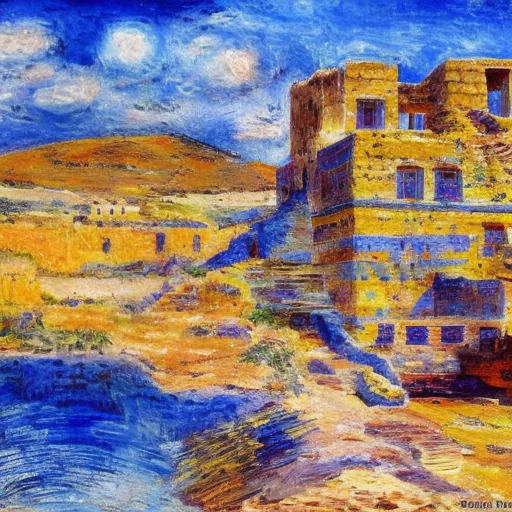
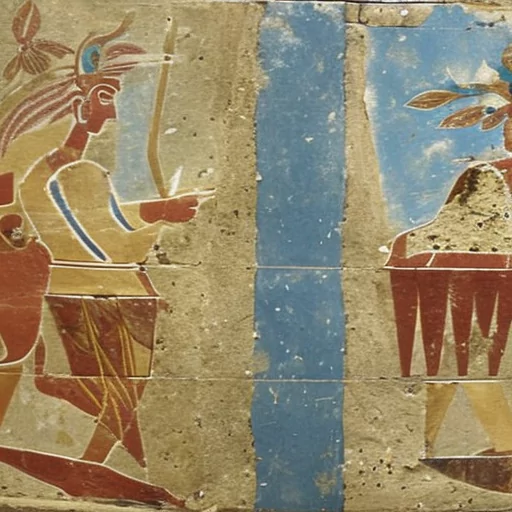
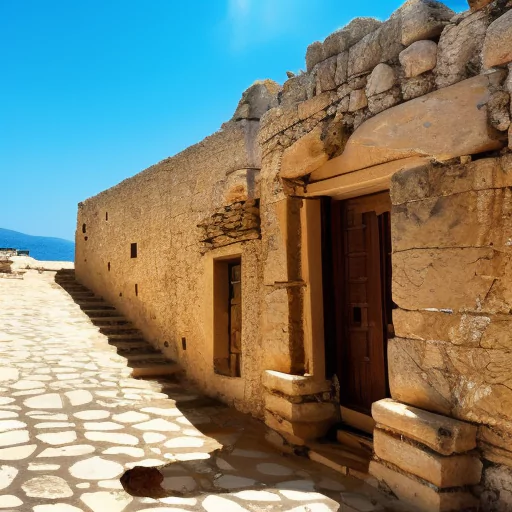
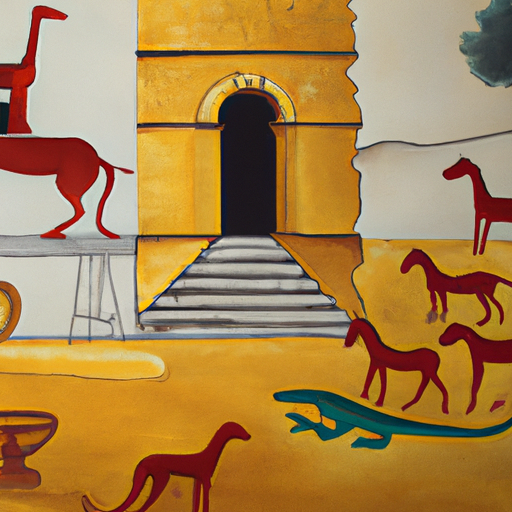
Adding {{itemName}} to cart
Added {{itemName}} to cart